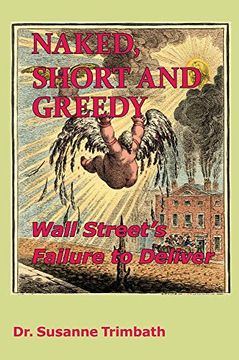Reseña del libro "Naked, Short and Greedy: Wall Street's Failure to Deliver (en Inglés)"
Audience: Investors, entrepreneurs, companies considering going public, policy makers. Summary: Rigged financial markets and hopeless under-regulation on Wall Street are not new problems. In this book, Susanne Trimbath gives a sobering account of naked short selling, the failure to settle, and her efforts over decades, trying to get this fixed.Part I. Opening ActThis is a cautionary tale. What started as a regulatory failure has turned into a regulatory crisis. Shareholder democracy is in shambles. The institutions that were established to correct a problem of trade settlement failures (failures to deliver shares for settlement) have instead exacerbated the problem. They may not survive what comes next. Chapter 1: Primer. A non-technical explanation of the terminology and concepts used in the book, plus the economic implications of trading phantom stock and bonds. Chapter 2: Start at the Beginning. Twenty-five years ago, when I was working backstage at Wall Street a group of corporate trust specialists told me about a problem in shareholder voting rights. When I went to senior management at Depository Trust Company (DTC), then and still the largest securities depository in the world, brushed it off saying, You can't balance the world.Part II. Back to Where I Left OffChapter 3: A Sidewalk Café in New York. At the request of a business colleague, I have coffee with a lawyer from Texas who tells me that a problem was about to blow up the financial markets: Wall Street brokers are using short sales and fails to deliver to grab the assets of American entrepreneurs. I feel a pang of guilt for not sticking it out to fix this before I left DTC in 1993. By 2003, it was a full-blown regulatory crisis! Chapter 4: Blind Men Describe an Elephant. When I start working on the issues after 2003, the lawyers, companies, investors and consultants I meet are like the blind men and a phantom share is the elephant. From a dentist in Michigan to a Republic operative in Washington DC, few of the self-described experts even knew what a naked short sale was before it either happened to them or someone hired them to pontificate on the subject.Part III. Committing to a CauseChapter 5: Real Experts Meet. The lawyers and several companies they represent are relying on poorly written reports provided by the Blind Men. Recognizing that the errors are piling up and having a negative impact on the outcomes in the court room, I bring in real experts, including the corporate trust specialists who first came to me in 1993. We coin the term phantom shares to describe the extra shares being created by short sales, stock lending and fails to deliver. Chapter 6: STA White Paper. The industry organization of corporate trust specialists, the Securities Transfer Association (STA) issues a report on over-voting after they are unable to get help from the Securities and Exchange Commission (SEC). Articles in their newsletter include a survey showing that over-voting - the direct result of investors voting phantom shares in corporate elections - impacts every public company. Almost immediately, the Securities Industry Association sends a letter to the NYSE describing how they can hide over-voting and the NYSE removes the last remaining rule that made it possible for a buyer to demand delivery of shares. A year later, over-voting is found in every corporate election surveyed by the STA. Even after the SIA implements processes to hide over-voting, the STA finds one-third of corporate elections are still receiving up to 25% more votes than there are shares outstanding. Chapter 7: Tax Consequences. My research shows that taxpayers and governments are losing out when interest and dividends are paid on phantom shares. The loss of tax revenue is not trivial: as much as $4.0 billion to the states and $1.5 billion to the federal government every year.Part IV. Success Seems PossibleChapter 8: Regulation SHO. I submit comment letters to the SEC that outline the financial and economic consequences of fails to deliver (FTD). When FTD reporting from NSCC to SEC begins, we are optimistic. Even though it is a list of victims (companies) but not the perpetrators (brokers), this is our first chance to see weekly and then daily data. We still don't know how old a fail is, but at least we have more frequent reports of the total value of fails and the number of shares failed per company. This chapter includes several of my comment letters explaining the implications for capital markets and the economy of the unfolding regulatory crisis, including the fact that Reg SHO had no enforcement teeth. It includes the attachments I submitted, like a copy of an NYSE audit proving that they knew that brokers were voting in corporate elections without regard to shareholder rights. Chapter 9: Criminal Cases Reveal Evidence. Although none of the lawsuits against the central clearing and settlement organizations (DTCC and its subsidiaries) is able to progress in the state courts, some organized crime cases result in settlement agreements and federal prosecutions. They move slowly but reveal evidence through discovery that supports the civil claims for several issuers against the brokers. This book does not detail financial crimes, but the cases against the primary perpetrators involved in manipulating Eagletech's stock are outlined to demonstrate the criminal strategies. We visit the more complete story of Eagletech Communications, Inc. in Chapter 10. Chapter 10: The Battle Goes Public. When a Dateline NBC segment on Eagletech is announced, the pajamahideen are emboldened, organizing protests and rallies including one on the sidewalk in front of DTCC's headquarters in Manhattan. The Dateline episode falls far short of the exposé everyone was hoping for. Later that year, the National Association of Securities Administrators Association (NASAA) holds a public forum in Washington, D.C. Publicity for the is

